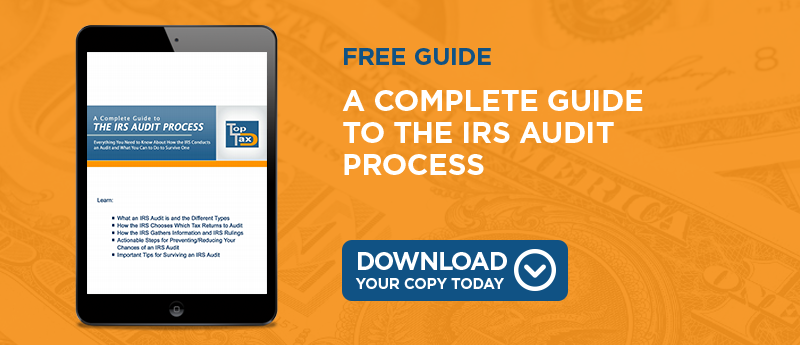
An IRS audit is one of the most feared experiences in the income tax world. Fortunately, very few taxpayers are selected for an audit each tax season. Still, some individuals have a higher risk of audit than others.
The IRS looks at several factors when deciding to audit an individual's return, including the type of employment, the amount of earned income, and claimed deductions. The good news is that even if you're chosen for an audit, you can arrange for professional and credible audit representation.
Likely Audit Targets
Some taxpayers are more likely than others to be audited. Likely individuals include:
- The self-employed - those who report their own income using either Schedule C or Schedule E, especially if profits were between $200,000 and $1 million in a fiscal year
- The wealthy - taxpayers who make more than$200,000 a year; the risk increases depending on how much more money they make
- Those that run cash-based businesses
- Individuals who claim itemized deductions
- Those who operate businesses that run on cash
- Property owners reporting rental losses
- Large donations to charitable organizations
- Showing a history of unaccounted income changes every year
The IRS often wants to see proof of your deductions before granting your refund. The good news is that less than 1% of small businesses per year face an audit.
What Does NOT Make You a Target?
People get some strange ideas about audit triggers. Many are just wrong. Common misconceptions include:
- Filing an extension increases your audit risk – no, it does not
- Claiming more deductions increases your chances of audit – no, it does not
- Amending your return increases your chance of an audit – and no, it does not
If you ever have a question about anything related to your taxes, ask your advisor, or contact a tax professional.
Purpose of an Audit
The primary goal of an audit is to check the accuracy of reporting and that the paperwork was filed correctly. The IRS wants to make sure they get all the money coming to them.
Being selected for an audit doesn't mean there is anything wrong with your return or your taxes. The IRS may be performing a routine check on the validity of your documentation.
The federal government has a few red flag notifications that cause them to look twice at a return. The rest come from a random sampling according to a computer algorithm.
Once a return is pulled for inspection, it is compared to other returns for businesses or lives similar to yours. If something looks different, the IRS may determine to continue an audit.
If you have any transactions related to partners or investors who are selected for audit, you may be audited, too.
What to Expect with an Audit
The IRS notifies by mail of the intent to audit your return. You will never receive a phone call from the IRS telling you that you are being audited and asking for your personal information.
The entire audit may be conducted by mail, keeping things simple. You will be asked for specific documentation and given other instructions. Be sure to respond to any requests completely and by their deadline, and the audit will be complete before you know it.
Of course, there is the potential for a face-to-face meeting with an auditor, either in the local IRS offices, your accountant’s office, your home, or at your place of business. Simply show the agent what they ask for and be available to answer questions. If you are expected at the office, you will be told what to bring with you.
What to Do If You Receive an Audit Notification
The number one rule is never to panic. The IRS has a pit bull reputation, but their agents are human and just want to do the job right. Contact your accounting team or tax advisor to let them know you have received an audit notice. Give them a copy so they can begin assembling any requested documentation.
Lean on your financial professional to guide you through the audit. You don’t have to do this alone, and the IRS is used to people bringing in help. A good tax advisor knows the procedures and practices for audits and accompanies you on the journey.
Ways to Avoid an Audit
To avoid an audit, make sure that you report all of your income wholly and accurately. Only claim deductions that you can back up with documentation and double-check all of your calculations. If you own your own business, use caution before reporting a loss for more than one year in a row.
Structure Your Business Appropriately
When you start a business, select the proper business structure. Will you be a sole proprietor, or do you need to incorporate? A business attorney or advisor can show you the pros and cons of each type of business entity.
Stay Organized
Keep all of your records, including returns from previous years, expense documentation, and receipts. Put everything together and keep it where you can find it easily.
Hire the Right Tax Advisor
Remember your goal is lowering your taxes and maximizing your refund. Make sure you and your advisor are on the same page. Know your deductions and tax credits so you can spot any problem areas before signing your return.
Contribute to an IRA to lower your taxes. Your advisor can help you find the IRA that’s best for you.
File and Pay on Time
Filing late brings you to the fed’s attention. Also, you will get hit with a late filing penalty. Make sure to pay on time as well. If you can’t get your return finished by the deadline, at least request an extension before Tax Day is over.
If you can’t pay the entire amount, pay as much as possible and apply for an installment plan for the rest. You will pay interest on your balance until it is gone, but better than being in default.
Getting Audit Representation
Sometimes you might be chosen for an audit no matter what precautions you take to avoid one. If you are selected for an IRS audit, don't panic. As long as you've reported your income and expenses honestly, you probably have nothing to worry about.
The issue is representing yourself capably when it's time to present your case. It's never a good idea to try to take on the IRS by yourself, even if you know your return is accurate. Getting the assistance of a qualified audit representation firm can give you the confidence you need to get through your audit successfully.
A Final Note…
While it's true that some tax returns are more likely to be audited than others, sometimes there's nothing you can do to prevent having your return audited. By hiring a skilled tax resolution specialist, though, you'll ensure that you present your case clearly and honestly.




